[English] 日本語
 Yorodumi
Yorodumi- PDB-1zg2: Solution NMR structure of the UPF0213 protein BH0048 from Bacillu... -
+ Open data
Open data
- Basic information
Basic information
| Entry | Database: PDB / ID: 1zg2 | ||||||
|---|---|---|---|---|---|---|---|
| Title | Solution NMR structure of the UPF0213 protein BH0048 from Bacillus halodurans. Northeast Structural Genomics target BhR2. | ||||||
 Components Components | Hypothetical UPF0213 protein BH0048 | ||||||
 Keywords Keywords | STRUCTURAL GENOMICS / UNKNOWN FUNCTION / BhR2 / Autostructure / Northeast Structural Genomics Consortium / PSI / Protein Structure Initiative / NESG | ||||||
| Function / homology |  Function and homology information Function and homology information: / GIY-YIG endonuclease / GIY-YIG endonuclease / GIY-YIG endonuclease / GIY-YIG endonuclease superfamily / GIY-YIG catalytic domain / GIY-YIG domain profile. / 3-Layer(aba) Sandwich / Alpha Beta Similarity search - Domain/homology | ||||||
| Biological species |  Bacillus halodurans (bacteria) Bacillus halodurans (bacteria) | ||||||
| Method | SOLUTION NMR / simulated annealing | ||||||
 Authors Authors | Aramini, J.M. / Swapna, G.V.T. / Xiao, R. / Ma, L. / Shastry, R. / Ciano, M. / Acton, T.B. / Liu, J. / Rost, B. / Cort, J.R. ...Aramini, J.M. / Swapna, G.V.T. / Xiao, R. / Ma, L. / Shastry, R. / Ciano, M. / Acton, T.B. / Liu, J. / Rost, B. / Cort, J.R. / Kennedy, M.A. / Montelione, G.T. / Northeast Structural Genomics Consortium (NESG) | ||||||
 Citation Citation |  Journal: To be Published Journal: To be PublishedTitle: Solution NMR structure of the UPF0213 protein BH0048 from Bacillus halodurans. Northeast Structural Genomics target BhR2. Authors: Aramini, J.M. / Swapna, G.V.T. / Xiao, R. / Ma, L. / Shastry, R. / Ciano, M. / Acton, T.B. / Liu, J. / Rost, B. / Cort, J.R. / Kennedy, M.A. / Montelione, G.T. | ||||||
| History |
|
- Structure visualization
Structure visualization
| Structure viewer | Molecule:  Molmil Molmil Jmol/JSmol Jmol/JSmol |
|---|
- Downloads & links
Downloads & links
- Download
Download
| PDBx/mmCIF format |  1zg2.cif.gz 1zg2.cif.gz | 309.4 KB | Display |  PDBx/mmCIF format PDBx/mmCIF format |
|---|---|---|---|---|
| PDB format |  pdb1zg2.ent.gz pdb1zg2.ent.gz | 256.3 KB | Display |  PDB format PDB format |
| PDBx/mmJSON format |  1zg2.json.gz 1zg2.json.gz | Tree view |  PDBx/mmJSON format PDBx/mmJSON format | |
| Others |  Other downloads Other downloads |
-Validation report
| Summary document |  1zg2_validation.pdf.gz 1zg2_validation.pdf.gz | 343 KB | Display |  wwPDB validaton report wwPDB validaton report |
|---|---|---|---|---|
| Full document |  1zg2_full_validation.pdf.gz 1zg2_full_validation.pdf.gz | 408.9 KB | Display | |
| Data in XML |  1zg2_validation.xml.gz 1zg2_validation.xml.gz | 16.6 KB | Display | |
| Data in CIF |  1zg2_validation.cif.gz 1zg2_validation.cif.gz | 26.8 KB | Display | |
| Arichive directory |  https://data.pdbj.org/pub/pdb/validation_reports/zg/1zg2 https://data.pdbj.org/pub/pdb/validation_reports/zg/1zg2 ftp://data.pdbj.org/pub/pdb/validation_reports/zg/1zg2 ftp://data.pdbj.org/pub/pdb/validation_reports/zg/1zg2 | HTTPS FTP |
-Related structure data
| Similar structure data | |
|---|---|
| Other databases |
- Links
Links
- Assembly
Assembly
| Deposited unit | 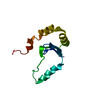
| |||||||||
|---|---|---|---|---|---|---|---|---|---|---|
| 1 |
| |||||||||
| NMR ensembles |
|
- Components
Components
| #1: Protein | Mass: 12556.251 Da / Num. of mol.: 1 Source method: isolated from a genetically manipulated source Source: (gene. exp.)  Bacillus halodurans (bacteria) / Plasmid: BhR2-21 / Production host: Bacillus halodurans (bacteria) / Plasmid: BhR2-21 / Production host:  |
|---|
-Experimental details
-Experiment
| Experiment | Method: SOLUTION NMR | ||||||||||||||||||||||||||||
|---|---|---|---|---|---|---|---|---|---|---|---|---|---|---|---|---|---|---|---|---|---|---|---|---|---|---|---|---|---|
| NMR experiment |
| ||||||||||||||||||||||||||||
| NMR details | Text: The structure was determined using triple resonance NMR spectroscopy. Partial automated backbone assignments were made using AUTOASSIGN, and the assignments were completed manually. Automatic ...Text: The structure was determined using triple resonance NMR spectroscopy. Partial automated backbone assignments were made using AUTOASSIGN, and the assignments were completed manually. Automatic NOESY assignments as well as distance and hydrogen bond constraints were determined using AUTOSTRUCTURE. Dihedral angle constraints were determined using HYPER and Talos. Completeness of NMR assignments (excluding N- and C-tags): backbone, 98%; side chain, 86%, aromatics, 100%; stereospecific methyl, 100%. Final structure quality factors (excluding the tags), where ordered residues [S(PHI) + S(PSI) > 1.8] comprise 7-16,19-25,27-38,51-85: (A) RMSD (6-30,48-86): BB 1.0; heavy atom, 1.6. FindCore RMSD: BB, 0.63; heavy atom, 0.86. (B) Ramachandran statistics for ordered residues: most favored, 96.7%, additionally allowed, 3.3%, generously allowed, 0.0%, disallowed, 0.0%. (C) Procheck scores for ordered residues (Raw/Z-): Phi-Psi, 0.02/0.39; All, -0.10/-0.59. (D) MolProbity clash score (Raw/Z-): 24.24/-2.63. (E) RPF scores for goodness of fit to NOESY data: F-measure, 0.916; Recall, 0.922; Precision, 0.910; DP-score, 0.663. |
- Sample preparation
Sample preparation
| Details |
| ||||||||||||
|---|---|---|---|---|---|---|---|---|---|---|---|---|---|
| Sample conditions | Ionic strength: 100 mM NaCl / pH: 6.5 / Pressure: ambient / Temperature: 293 K |
-NMR measurement
| Radiation | Protocol: SINGLE WAVELENGTH / Monochromatic (M) / Laue (L): M | |||||||||||||||||||||||||
|---|---|---|---|---|---|---|---|---|---|---|---|---|---|---|---|---|---|---|---|---|---|---|---|---|---|---|
| Radiation wavelength | Relative weight: 1 | |||||||||||||||||||||||||
| NMR spectrometer |
|
- Processing
Processing
| NMR software |
| ||||||||||||||||||||||||||||||||||||||||||||||||
|---|---|---|---|---|---|---|---|---|---|---|---|---|---|---|---|---|---|---|---|---|---|---|---|---|---|---|---|---|---|---|---|---|---|---|---|---|---|---|---|---|---|---|---|---|---|---|---|---|---|
| Refinement | Method: simulated annealing / Software ordinal: 1 Details: The structures are based on a total of 835 conformationally-restricting NOE-derived distance constraints, 250 dihedral angle constraints, and 52 hydrogen bond constraints (12.2 constraints ...Details: The structures are based on a total of 835 conformationally-restricting NOE-derived distance constraints, 250 dihedral angle constraints, and 52 hydrogen bond constraints (12.2 constraints per residue excluding tags; 2.9 long range constraints per residue). Structure determination was performed iteratively using AUTOSTRUCTURE (Xplor). The 10 lowest energy structures were further refined by restrained molecular dyanmics/energy minimization in explicit water (CNS). The unstructured N- (MAGDP) and C- (LEHHHHHH) terminal tags were included in all calculations but have been omitted from this deposition. | ||||||||||||||||||||||||||||||||||||||||||||||||
| NMR representative | Selection criteria: lowest energy | ||||||||||||||||||||||||||||||||||||||||||||||||
| NMR ensemble | Conformer selection criteria: structures with the lowest energy Conformers calculated total number: 56 / Conformers submitted total number: 10 |
 Movie
Movie Controller
Controller


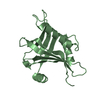
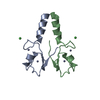

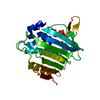
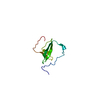
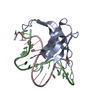
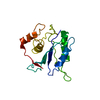
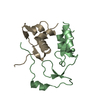
 PDBj
PDBj HSQC
HSQC